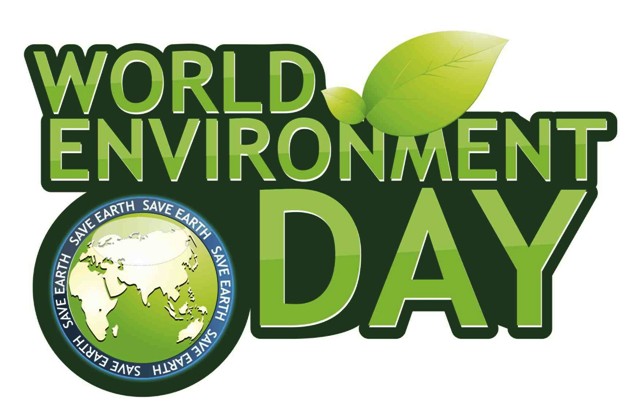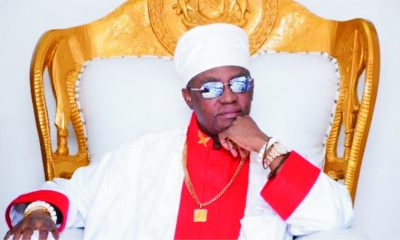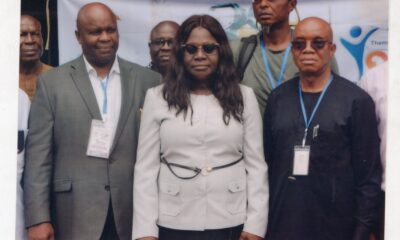Editorial
Owo Massacre: Shame Of A Nation

Last Sunday’s attack on St. Francis Catholic Church, Owo, Ondo State, was a reproach to Nigeria, leaving
no one in doubt that terrorism has been fully entrenched in every part of the country. According to reports, while worship service was on, gunmen, armed with explosives and automatic weapons, opened fire on the worshippers. The gunmen put up the appearance of being first-time visitors, only to gun down the unsuspecting worshippers, killing dozens and injuring some others.
Nigeria’s terrorists have spread all over the country on various fronts. And, unlike the docile Federal Government and some visionless state governors, the terror groups have an objective, a technique, and an obligation to their ferocious undertaking. The Ondo fatality figure is uncertain. While some put it at 35, others raised it as high as 50 or even 60. The incident was a picture of a monstrous church that looked like a slaughterhouse, with citizens of this country lying helpless on the church floor among the pews.
Indeed, there is no safe place anymore. The attackers dealt a fatal blow to the church. The church service was reportedly coming to an end when gunfire rang out from all directions. Using the element of astonishment, the attackers overwhelmed the unprepared congregation. Among the dead were women and children, and the numbers are rising as some victims who were ferried to different medical facilities died of their injuries.
This tragedy is akin to the bloody brutality of the barbarians that many have seen. The criminals chose Owo, the hometown of Governor Rotimi Akeredolu, perhaps because the governor has been an advocate of true federalism, especially insisting that predators who claim to be harmless herders should not get free permits. When he insisted that certain forests were sanctuaries that no one could trespass, he clashed with the Federal Government, who invoked the right to free movement in the country.
The daily attacks and many other events across the country reflect the horrific damage done to the disintegrating coalition by President Muhammadu Buhari’s regime. His incompetence and poor leadership are mixed with the actions of governors and federal and state lawmakers, who refuse to press for immediate changes to the 1999 Constitution to promote state policing or create effective local security agencies.
We hope that Nigerians will not continue to see this as a routine in their national life. Only last April, terrorists, suspected to be the Ansaru arm of the Boko Haram sect, attacked a military base at Polewire in Birnin-Gwari, Kaduna State, killing 17 soldiers and injuring 40 others, after a fierce gun battle between both parties. The gunmen also killed three locals, razed four armoured vehicles and went away with military weapons after killing the soldiers.
Since Boko Haram launched a bloody insurgency in 2009 in the North-East, more than 30,000 people have been killed and nearly three million displaced in more than a decade of terror activities in Nigeria, according to the United Nations Office for the Coordination of Humanitarian Affairs. Violence committed by insurgents has affected over 26 million people in the Lake Chad region and displaced 2.6 million others, according to the UN Refugee Agency.
How long shall Nigerian citizens be restrained from moving around the country without fear of what is ahead, or what is behind them? We live as sojourners in fear. Gone are the days when people could wake up and eye the highway for a trip. Yet, the dead in Ondo were at home, at a place of worship, sedentary and kneeling, no trip ahead. But the criminals came bearing arms and bombs, detonating tragedy.
The spread of terrorism across the country has long been predicted. But as usual, governments and security agencies have neither heeded the alarm nor acted preemptively. The latest warnings came from Nobel laureate, Wole Soyinka, Kaduna State Governor, Nasir el-Rufai, and other prominent figures, who had warned authorities that terrorists were spreading across the country.
Similarly, other groups and individuals, through statements, online videos and reports to security agencies, had been warning for years that Islamic terrorists, Fulani herders/terrorists, rated the world’s deadliest terror group, had ravaged the forests and shanty towns of the South-West by the thousands. We can only say that it is a delinquency of the Federal Government. For such catastrophe as this to continue without let, and nothing has deterred them, calls for citizens to seek ways to secure themselves.
Nigeria appears to be in an irreversible state of national defeat. The Federal Government has politicised insecurity. In the process, Buhari lost control. Under his leadership, Fulani herders, coupled with Fulani bandits from all over West and Central Africa, have become an occupying army, numbering in the tens of thousands. They inflict terror on Nigerians. Inspired by a seemingly sympathetic Presidency, a security system with unbalanced leadership tilted extremely in their racial and sectarian direction, they operate everywhere with eerie impunity.
Ondo, like many other states, has suffered from Fulani buccaneers. Nomads once abducted former Finance Minister, Olu Falae, from his Akure farm. He was brutalised and compelled to pay a ransom before his release. He was not the only one. Funke Olakunrin, a daughter of the Afenifere leader, Reuben Fasoranti, was gruesomely murdered by herdsmen in July, 2019. Since then, Akeredolu has been at the forefront of ridding the region of the murderous gang.
Unfortunately, the refusal of the government to properly investigate or take definite actions to ensure justice or deter future occurrences continues to exacerbate the crises. Since their emergence, herdsmen and banditry attacks have risen exponentially as the authorities have failed to demonstrate the capacity to address the insecurity plaguing the country.
The Owo massacre again raises the question of governance misprision, considering that our 1999 Constitution asserts security and welfare of citizens as a primary responsibility of the government. The same Constitution centralises the command and control of security establishments in the Federal Government through the President. Hence, Buhari must take prompt measures beyond denouncing the truculent act to end insecurity in the country.
Editorial
Responding To Herders’ Threat In Rivers

Editorial
Democracy Day: So Far…

Nigeria’s return to democratic rule in 1999 marked a watershed moment in the nation’s political history. After enduring nearly 16 years of successive military dictatorships, Nigerians embraced a new era of civil governance with the inauguration of President Olusegun Obasanjo on May 29, 1999. Since then, the country has sustained a democratic system for 26 years. But, this democratic journey has been a complex mix of progress and persistent challenges.
The formal recognition of June 12 as Democracy Day in 2018 by former President Muhammadu Buhari acknowledged a long-standing injustice. The annulment of the 1993 presidential election, Nigeria’s freest, betrayed the democratic aspirations of millions. That it took decades to honour this date reflects the nation’s complex relationship with its democratic memory.
One of the most momentous successes of Nigeria’s democracy has been the uninterrupted civilian rule over the last two and a half decades. The country has witnessed seven general elections, with power transferring peacefully among different political parties. This is particularly notable considering that prior to 1999, no civilian government had completed a full term without military intervention. The peaceful transitions in 2007, 2015, and 2023 are testaments to Nigeria’s evolving democratic maturity.
Electoral participation, while uneven, has also reflected a level of democratic engagement. In 2003, voter turnout stood at about 69 per cent, but this figure dropped to approximately 34.75 per cent in 2023, according to the Independent National Electoral Commission (INEC). Although the declining turnout raises concerns, it also highlights the increasing expectations of the electorate, who demand credible and transparent elections.
Another area of progress is the growth of a vibrant and free press. Nigerian media has played a crucial role in holding governments accountable and fostering public discourse. Investigative journalism and civil society activism have exposed corruption and human rights abuses. The rise of social media has further expanded the democratic space, enabling young Nigerians to mobilise and advocate for change, as evidenced by the 2020 #EndSARS protests.
Judicial independence has seen mixed results. On one hand, the judiciary has occasionally demonstrated resilience, such as in landmark rulings that overturned fraudulent elections or curtailed executive excesses. On the other hand, allegations of political interference and corruption within the judiciary persist, undermining public confidence in the legal system’s impartiality.
Nigeria’s democracy has also facilitated the decentralisation of power through the federal system. State governments now wield some autonomy, allowing for experimentation in governance and service delivery. While this has led to innovative policies in some states, it has also entrenched patronage networks and uneven development across the federation.
Despite these successes, Nigeria’s democratic journey faces formidable problems. Electoral integrity remains a critical concern. Reports from election observers, including those from the European Union and ECOWAS, frequently highlight issues such as vote-buying, ballot box snatching, and violence. The introduction of the Bimodal Voter Accreditation System (BVAS) and electronic transmission of results in 2023 elections showed promise, but technical glitches and alleged manipulations dampened public trust.
Corruption continues to be a pervasive issue. Nigeria ranks 145th out of 180 countries on Transparency International’s 2023 Corruption Perceptions Index, with a score of 25/100. Democratic institutions meant to check graft—such as anti-corruption agencies and the legislature—often struggle due to political interference and weak enforcement mechanisms.
Security challenges have also strained Nigeria’s democracy. Insurgency in the North East, banditry in the North West, separatist agitations in the South East, and herder-farmer conflicts across the Middle Belt have collectively resulted in thousands of deaths and displacements. According to the Global Terrorism Index 2024, Nigeria ranks as the eighth most impacted country by terrorism. The government’s difficulty in ensuring safety erodes public confidence in the state’s capacity and legitimacy.
The economy poses another critical remonstrance. Nigeria’s Gross Domestic Product (GDP) per capita stands at approximately $2,400 as of 2024, with over 40 per cent of the population living below the national poverty line. High unemployment and inflation have fueled discontent and disillusionment with democratic governance, especially among youth. Without addressing economic grievances, the democratic dividend will remain elusive for many Nigerians.
Ethnic and religious divisions further complicate Nigeria’s democratic consolidation. Politicians often exploit identity politics for electoral gains, exacerbating social tensions. Although federal character principles aim to promote inclusiveness, they have also sometimes fostered a quota mentality rather than merit-based appointments.
Gender representation remains inadequate in Nigeria’s democratic institutions. Women occupy less than 10 per cent of seats in the National Assembly, one of the lowest rates globally. Efforts to pass gender parity bills have faced stiff resistance, highlighting deep-seated cultural and institutional barriers to female political participation.
Civil liberties, while constitutionally guaranteed, are under threat. Crackdowns on protesters, restrictions on press freedom, and surveillance of activists reveal an authoritarian streak within the democratic framework. The controversial Twitter ban in 2021 exemplified the country’s willingness to curb digital freedoms, prompting domestic and international criticism.
The political crisis in Rivers State embodies broader democratic struggles. Attempts to control the state through undemocratic means expose weaknesses in federal institutions and the rule of law. Immediate restoration of democratic governance in Rivers State is vital to preserving Nigeria’s democratic integrity and institutional credibility.
Local governments remain under the control of state governors, depriving citizens of grassroots democracy. Last year’s Supreme Court judgment on local government autonomy is promising, but state-level resistance threatens its implementation. Genuine autonomy would bring governance closer to the people and foster democratic innovation.
As we mark Democracy Day, we must honour the sacrifices of Chief M.K.O. Abiola, Kudirat Abiola, Femi Falana, Chief Gani Fawehinmi, Pa Alfred Rewane, President Bola Tinubu, and countless others, who fought for Nigeria’s freedom. As democracy in Nigeria continues to evolve after 26 years, this day should inspire action toward its renewal. With despotism and state failure as real threats, both citizens and leaders must take responsibility—citizens by demanding more, and leaders by delivering. Excuses are no longer acceptable.
Editorial
Nigeria’s Plastic Pollution Emergency

Yesterday, Nigeria joined the rest of the world to mark 2025 World Environment Day. The occasion serves as a stark reminder that our battle against plastic pollution requires more than symbolic gestures—it demands sustained, coordinated action from all levels of government. As communities worldwide grapple with mounting environmental challenges, Nigeria’s approach to plastic waste management stands at a critical juncture.
Dr. Ibinabo Ogolo, a Research Fellow at the Institute of Geosciences and Environmental Management at Rivers State University, has issued a timely call for comprehensive enlightenment campaigns targeting indiscriminate plastic waste disposal. Her message resonates with the urgency that characterises this year’s global theme: “Beat Plastic Pollution.”
The core challenge lies not in policy formulation but in implementation. Years of environmental initiatives have fallen short primarily due to inadequate public education and awareness campaigns. Citizens cannot be expected to adopt responsible waste disposal practices without understanding the gravity of their actions or knowing the proper alternatives.
Government platforms at federal, state, and local levels possess the infrastructure necessary to reach every corner of our society. Television, radio, social media, community meetings, and educational institutions provide ready channels for sustained messaging. The tools exist; what remains is the political will to deploy them effectively and consistently.
This year’s World Environment Day theme underscores the global recognition of plastic pollution’s devastating impact on ecosystems, wildlife, and human health. The message is clear: plastic waste represents one of the most pressing environmental challenges of our time, requiring immediate and sustained attention from policymakers and citizens alike.
The health implications of plastic pollution extend far beyond environmental aesthetics. Industrial and medical plastic wastes often contain toxic chemicals with carcinogenic properties, posing direct threats to human health. These materials don’t simply disappear when improperly disposed of-they infiltrate our environment, contaminating soil, water sources, and food chains.
Plastic additives released into the environment create a cascade of contamination that affects entire ecosystems. Wildlife suffers through ingestion, entanglement, and habitat destruction, while humans face exposure through contaminated water, food, and air. The interconnected nature of these impacts demands a comprehensive response that addresses both immediate disposal practices and long-term prevention strategies.
The link between plastic pollution and serious health conditions, including breast, ovarian, liver, and lung cancers, as well as various hormonal disorders, underscores the urgency of public education campaigns. Citizens have the right to understand how their daily choices affect not only environmental health but their own well-being and that of their families.
Despite scientific awareness of ocean plastic pollution dating back approximately 50 years, Nigeria’s rivers, creeks, and waterways continue to suffer from plastic waste invasion. This represents a failure of sustained commitment rather than a lack of knowledge about the problem’s existence and solutions.
The ritualistic approach to World Environment Day celebrations must end. Annual speeches and symbolic cleanups, while valuable, cannot substitute for year-round, systematic efforts to change behaviour and protect our environment. Governments must develop comprehensive frameworks that extend beyond June 5th commemorations.
Sustained enlightenment campaigns require dedicated funding, clear messaging, measurable objectives, and regular evaluation. Success depends on consistency, creativity, and community engagement that transforms environmental protection from a government mandate into a shared cultural value.
The path forward demands that all stakeholders-government officials, community leaders, educators, and citizens-recognize their roles in combating plastic pollution. Only through sustained, coordinated efforts can we hope to achieve the behavioural changes necessary to protect our environment and secure a healthier future for generations to come.
-
News2 days ago
Military Kills 6,260 Terrorists, Rescues 5,365 Civilians In 2 Years – DHQ
-

 News2 days ago
News2 days agoBenin Monarch Receives 119 Stolen Artefacts From Netherlands
-
Sports2 days ago
Winners Emerge At Lagos Cricket League
-
Business2 days ago
Nigeria, Others Listed On UN’s Worsening Hunger Hotspots
-
Business2 days ago
Create Diving Schools, Expert Urges FG
-

 News2 days ago
News2 days agoFoundation Tasks Parents, Families On Moral Rectitude
-
News2 days ago
COAS Hails 542 New Military Retirees Over Selfless Service
-

 Politics2 days ago
Politics2 days agoYou Weren’t Elected To Bury People, Tinubu Tells Alia

